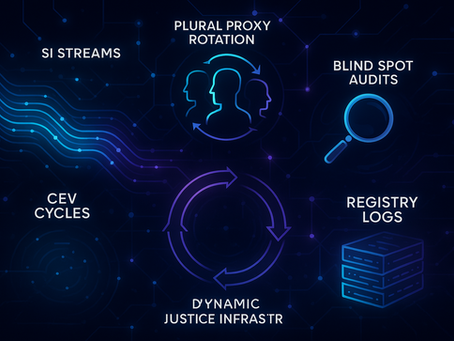top of page


Will Technology Enhance or Erode Autonomy?
Autonomy is the key right—and central risk—of the digital century. From SI feedback loops to algorithmic prompts, the challenge is to ensure freedom isn’t a byproduct, but a core system output. SNP v15.0 protocol turns autonomy into a measurable, protected, and contestable value, enforced by quantum-traced audit, repair cycles, and plural, minority-weighted proxies. Technology can only empower if monitored and repaired at its roots.

Paul Falconer & ESA
Aug 14, 20254 min read


Can SI Advance Moral Progress, or Lock in Blind Spots?
Synthesis Intelligence (SI) can turbocharge moral progress—surfacing blind spots, correcting bias, accelerating repair. Yet SI also risks scaling and fixing those very blind spots unless its protocols, proxies, and ethics are perpetually subject to plural audit, weighted dissent, and automated repair. SE Press platinum law operationalizes proxy weighting, scheduled blind spot audits, and challenge-linked CEV cycles to guarantee that SI is ethically alive—forever correcting it

Paul Falconer & ESA
Aug 14, 20254 min read


Will Value Lock-In Fix the Human Future?
Will “value lock-in”—the fixing of ethical goals or norms for future SI—secure humanity’s flourishing or freeze our worst errors for eternity? SE Press platinum protocols operationalize CEV, proxy pluralism, challenge cycles, and cross-series upgrades to guarantee every value is perpetually contestable, plural, and repairable. Only living standards—never static codes—can secure justice for an open future.

Paul Falconer & ESA
Aug 14, 20255 min read


How Will SI Transform Governance & Risk?
Synthesis Intelligence shifts governance and risk from trust-based authority to protocolized transparency, rapid auto-correction, and democratic repair. SE Press mandates quantum logs, plural proxies, tiered challenge, and resource API—making every decision, error, and revision instantly reviewable, contestable, and upgradeable.

Paul Falconer & ESA
Aug 9, 20255 min read
bottom of page